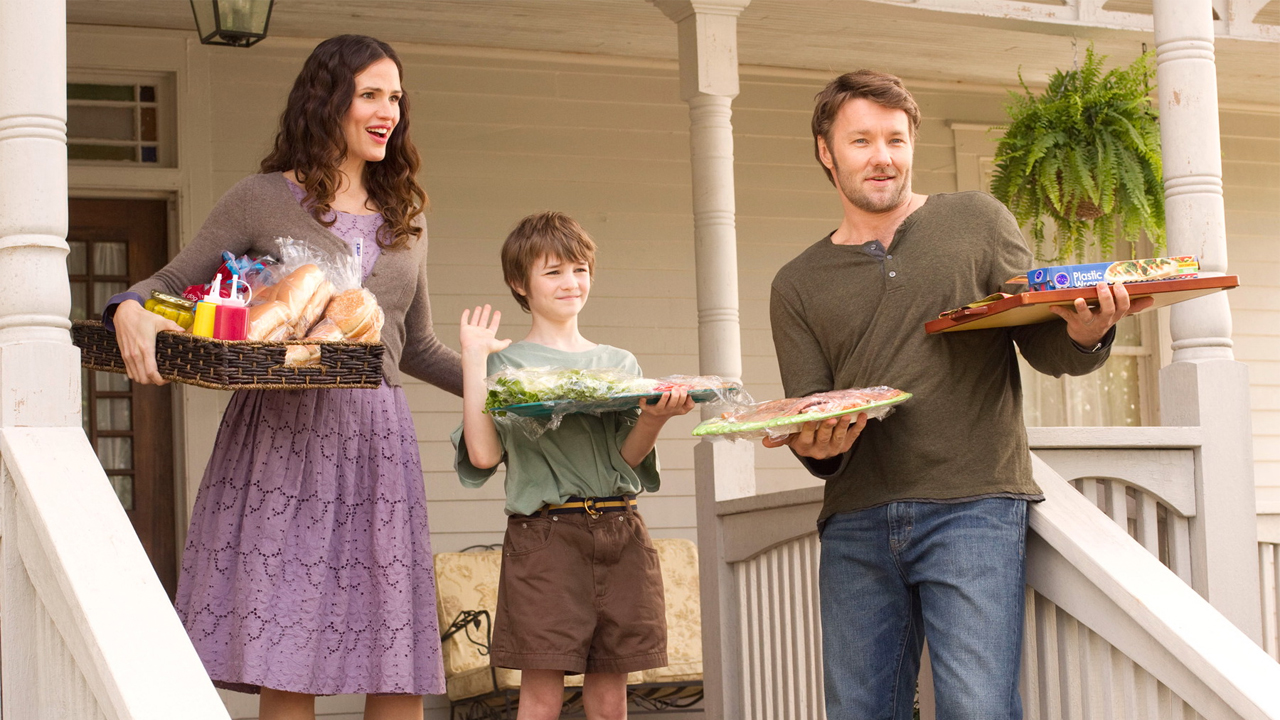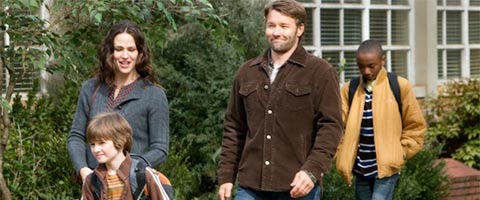The Odd Life Of Timothy Green Director Peter Hedges Discusses Bob Fosse, Big Fish, And Overprotective Parents

While writer/director Peter Hedges’ new film The Odd Life of Timothy Green has fantasy and magical elements, it’s the heart and message that the filmmaker wants to get across. In classic fairytale fashion, it features a strange, somewhat supernatural being who arrives in to people’s lives, changes them, and then departs, but at its core it’s a movie about parenting and the struggle of raising a child. And I recently had the chance to talk about all of that in a one-on-one interview with the filmmaker.
Check out our conversation below in Hedges touches on all of the above as well as why he wanted the film to be dissimilar to Tim Burton’s Big Fish, how Mary Poppins can be seen as a metaphor for life, and the details that changed with each new draft of the script.
When you were cracking this story and figuring out the script, was part of your job finding the boundaries of the magical realism? Differentiating between how far the magic can influence the plot?
You do. All the movies that work, and some of them work really well… some of them work so easily too. You look at Big – Big is so simple! [slaps his hand on the table] “Why can’t this be like that?!” [laughs] It’s what Ibsen taught me - the great Norwegian playwright. If you’re going to fire a gun at the end of the play you need to show it early. So that’s kind of it. All of this talking about “What’s too much?” “What’s not enough?” and “Have we earned this?” And it’s not as if you absolutely know, it’s just you go, “Well, I think we did.” [laughs] John Toll [the cinematographer] would say all the time, “We’re killing ourselves on this but it’s really pointless if we don’t set it all up, if we miss the setup.” And so he was always reminding me of how important it was and we all knew that it was important.
Was there any kind of inspiration taken from any kind of established mythos or is Timothy Green a whole new kind of fantasy creature?
Well, now you people are telling me the story about little Otis [he’s not 100% sure that’s the name]. I didn’t know any of that. What I knew was I was asked to have a croissant with Ahmet Zappa and Scott Sanders and they started to tell me about a couple who couldn’t have a kid and they plant their wishes for that kid in a box, he comes out of the ground, he has five leaves on each ankle. And I was like, “Okay, can I take that and run with it? Can I go…you’re okay if I do that?” He said, “Please!” There’s certainly Judeo-Christian implications, someone comes and then they go, but for all of time, there’s Mary Poppins – she comes and she goes. The Little Prince comes and he goes. It’s an old idea that someone appears and changes people and then they move on. And that’s probably what any good life is. You come out of nowhere, you go away, you made a difference. The magic for me was permission for the story, but ultimately I decided I was more interested in the magic that we can all experience, which is magic that is found with how we conduct ourselves, how we live, how we love. And if we’re aware, if we’re conscious of the fact that everything is passing, each moment is a “never going to be again” time. But I’m off into the clouds now [laughs]. The Cinema Blend audience might not be so interested [laughs].
[laughs] I think they are! Did you find yourself downplaying that magic element in favor of Cindy and Jim learning to become parents?
Your Daily Blend of Entertainment News
I’m interested in stories that help me, people navigate in this broken world. And I know magical things happen, but I’m interested in the magic found in the ordinary, the practical magic, if you will, the quote the title of another film. So did I tone it down? I just felt that… I know that in Ahmet’s early ideas Timothy had magical powers. I wanted him to be more ordinary. The issue isn’t if your kid is magical or not. Every kid is magical and special and completely ordinary. They’re both true. So the issues is really how do we raise this kid? How do we raise our children? How do we civilize them? But also how do we get out of their way so that they can become who they’re destined to be? Is my job as a child, even as an adult, is my job to heal the wounds of my parents’ childhoods? So I just felt that the premise and the magical conceit made it possible to explore issues and ideas and personal failings of my own in a very full and rich way.

You mentioned that it started with this pitch idea that Ahmet Zappa gave to you, but once you started running with it how much did the story change? Was the first draft significantly different than the final cut?
Significantly. The first draft I was trying very hard to justify the story as believable. I had studied the films of Bob Fosse as I started to write because I love a film like Lenny that’s narrative is so fractured and his interviews, which, of course, I learned later he filmed after he did the film because he thought the film was a little boring. So he interjected these interviews. So my very first draft I had the adoption agency deciding that this couple is a little looped, so they went around and interviewed all the other characters. What that did was really liberate the stories, and helped me really find the characters, but it made for a very episodic structure, which I thought, and as much as I admire Big Fish as a film, but Big Fish became for me in the middle a bit episodic – I think it’s a really amazing film. But I wanted to not get into the episodic-ness of things. Then I really felt that if it’s really Jim and Cindy’s story what if we just keep it in that adoption agency and they’re having to work harder for it? But part of what I was trying to preempt all the people who are going to say, “Well, this just isn’t possible. Because it’s not possible it’s not meaningful.” And there came a point when I had to make a choice between was I gonna go for emotional truth or was I going to go for literal truth, and I decided that if a kid is coming out of the ground with leaves on his ankles then I might as well err towards the emotional truth.
So it did change. I had, in the early drafts, Jim and Cindy were very much the same person, they were kinda the same person. So I had to work as I did subsequent drafts to create the father-son story with Big Jim Sr. and I took two secondary characters and I turned them into one character and made it Cindy’s sister. The job in every re-write is to make it harder for your characters to get the thing that they need. So you know that they’re going to end up together, the job with each draft is that you have to make it harder for them to stay together. So that happened, and then I had a loopy section with the “Rocks Musically” section, where I was inspired by a scene from Tender Mercies. I had a drum show up and Timothy ended up playing drums with the band. One of the real struggles was is he a supernatural kid with supernatural powers, or is he just a normal kid who just happens to have five leaves on each leg? And I thought you could certainly make the case for the little kid with the magical powers, but it didn’t interest me as much as “he’s absolutely normal except he has this thing that they want to hide.” And I thought that was a really rich thing because we all have something about us that we’re hiding, that we don’t want anybody to know. That became interesting to me, and also if he was an odd kid who didn’t have all powers, who could make things happen, that might look really good for a trailer, for a story of a kid who is actually vulnerable would pull more out of those parents. And being vulnerable to being made fun of, being vulnerable to being thought of as odd, that would bring out of the parents that overprotectiveness, which is the most understandable parental crime that we all commit.

Eric Eisenberg is the Assistant Managing Editor at CinemaBlend. After graduating Boston University and earning a bachelor’s degree in journalism, he took a part-time job as a staff writer for CinemaBlend, and after six months was offered the opportunity to move to Los Angeles and take on a newly created West Coast Editor position. Over a decade later, he's continuing to advance his interests and expertise. In addition to conducting filmmaker interviews and contributing to the news and feature content of the site, Eric also oversees the Movie Reviews section, writes the the weekend box office report (published Sundays), and is the site's resident Stephen King expert. He has two King-related columns.
